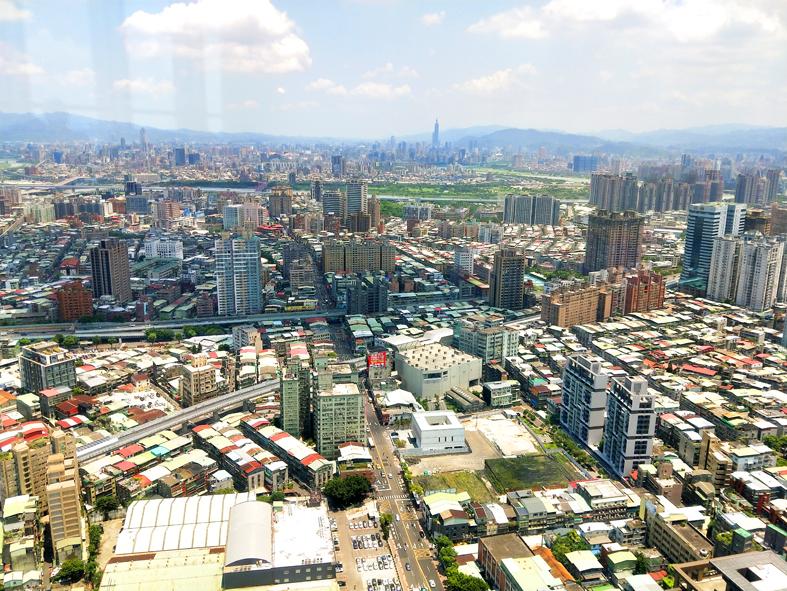Real-estate transactions in special municipalities last month increased 25 percent from last year, helped by a large amount of liquidity in the market, data released by the six cities showed.
Last month, Taipei, New Taipei City, Taoyuan, Taichung, Tainan and Kaohsiung had a total of 24,594 home, shop, office and factory transactions, up 25 percent from a year earlier and up 13 percent from October, the data showed.
Rising liquidity levels and low interest rates drove the booming property market, said Jessica Hsu (徐佳馨), head of the research department at real-estate agency H&B Business Group (住商不動產).

Photo: Ho Yu-hua, Taipei Times
The surge reflected a relatively low comparison base for the same period last year, Taiwan Realty Enterprise Group (台灣房屋集團) section head Charlene Chang (張旭嵐) added.
Some property developers began presales for new projects during the peak buying season, which also helped last month’s sales, she said, adding that presales especially helped sales in New Taipei City, Taoyuan, Taichung and Kaohsiung.
Taichung recorded the highest year-on-year growth at 53 percent, with 5,191 residential and commercial transactions, the data showed.
Taipei, the nation’s most closely watched property market, had 3,271 property transactions, up 37 percent from last year and up 21 percent from October.
New Taipei City had 6,047 property transactions (up 20 percent annually and 9 percent monthly), Taoyuan had 4,277 (up 9 percent annually and 23 percent monthly) and Tainan had 2,068 (up 13 percent annually and 11 percent monthly), while Kaohsiung had 3,740 property transactions (up 20 percent annually and 16 percent monthly), the data showed.

UNCERTAINTY: Innolux activated a stringent supply chain management mechanism, as it did during the COVID-19 pandemic, to ensure optimal inventory levels for customers Flat-panel display makers AUO Corp (友達) and Innolux Corp (群創) yesterday said that about 12 to 20 percent of their display business is at risk of potential US tariffs and that they would relocate production or shipment destinations to mitigate the levies’ effects. US tariffs would have a direct impact of US$200 million on AUO’s revenue, company chairman Paul Peng (彭雙浪) told reporters on the sidelines of the Touch Taiwan trade show in Taipei yesterday. That would make up about 12 percent of the company’s overall revenue. To cope with the tariff uncertainty, AUO plans to allocate its production to manufacturing facilities in

TAKING STOCK: A Taiwanese cookware firm in Vietnam urged customers to assess inventory or place orders early so shipments can reach the US while tariffs are paused Taiwanese businesses in Vietnam are exploring alternatives after the White House imposed a 46 percent import duty on Vietnamese goods, following US President Donald Trump’s announcement of “reciprocal” tariffs on the US’ trading partners. Lo Shih-liang (羅世良), chairman of Brico Industry Co (裕茂工業), a Taiwanese company that manufactures cast iron cookware and stove components in Vietnam, said that more than 40 percent of his business was tied to the US market, describing the constant US policy shifts as an emotional roller coaster. “I work during the day and stay up all night watching the news. I’ve been following US news until 3am

COLLABORATION: Given Taiwan’s key position in global supply chains, the US firm is discussing strategies with local partners and clients to deal with global uncertainties Advanced Micro Devices Inc (AMD) yesterday said it is meeting with local ecosystem partners, including Taiwan Semiconductor Manufacturing Co (TSMC, 台積電), to discuss strategies, including long-term manufacturing, to navigate uncertainties such as US tariffs, as Taiwan occupies an important position in global supply chains. AMD chief executive officer Lisa Su (蘇姿丰) told reporters that Taiwan is an important part of the chip designer’s ecosystem and she is discussing with partners and customers in Taiwan to forge strong collaborations on different areas during this critical period. AMD has just become the first artificial-intelligence (AI) server chip customer of TSMC to utilize its advanced

Six years ago, LVMH’s billionaire CEO Bernard Arnault and US President Donald Trump cut the blue ribbon on a factory in rural Texas that would make designer handbags for Louis Vuitton, one of the world’s best-known luxury brands. However, since the high-profile opening, the factory has faced a host of problems limiting production, 11 former Louis Vuitton employees said. The site has consistently ranked among the worst-performing for Louis Vuitton globally, “significantly” underperforming other facilities, said three former Louis Vuitton workers and a senior industry source, who cited internal rankings shared with staff. The plant’s problems — which have not